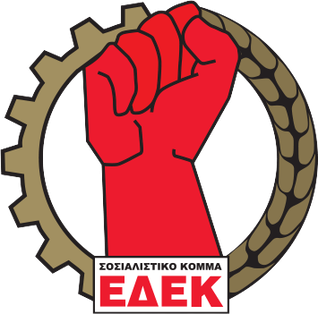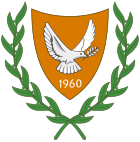
The Progressive Party of Working People is a Marxist–Leninist communist party in Cyprus.

Makarios III was a Greek Cypriot archbishop, primate, statesman and politician, who served as the first President of Cyprus between 1960 and 1977. He was also the Archbishop of the autocephalous Church of Cyprus from 1950 to 1977.

Efstathios "Tassos" Nikolaou Papadopoulos was a Cypriot politician and barrister, who served as President of Cyprus from 2003 to 2008.

The EDEK Socialist Party is a Greek Cypriot nationalist, social-democratic political party in Cyprus.

Glafcos Ioannou Clerides was a Cypriot statesman, who served as President of Cyprus in 1974 and from 1993 to 2003.

At the national level, the Republic of Cyprus holds elections for its head of state, the President of Cyprus, and for its legislature, the House of Representatives.

Cyprus was part of the British Empire, under military occupation from 1914 to 1925, and a Crown colony from 1925 to 1960. Cyprus became an independent nation in 1960.

The London and Zürich Agreements for the constitution of Cyprus started with an agreement on 19 February 1959 in Lancaster House, London, between Turkey, Greece, the United Kingdom and Cypriot community leaders. On that basis, a constitution was drafted and agreed together with two prior Treaties of Alliance and Guarantee in Zürich on 11 February 1959.

Presidential elections were held in Cyprus on 16 February 2003. The election campaign was dominated by the ongoing negotiations over the Annan Plan for Cyprus. Incumbent President Glafkos Klerides was largely in favour of the plan, while leading opposition candidate Tassos Papadopoulos wanted substantial amendments before he would accept it. Papadopoulos in the first round with 52% of the vote. Voter turnout was 91%.

Vassos Lyssarides was a Cypriot politician and physician who was a central figure in the politics of Cyprus after the island's independence.

Presidential elections were held in Cyprus on 25 February 1968. The result was a victory for the incumbent President Makarios III, who received 96% of the vote. Voter turnout was 93%.

Presidential elections were due to be held in Cyprus on 18 February 1973. However, as incumbent President Makarios III was the only candidate, the elections were not held and Makarios III was automatically declared the winner.

Parliamentary elections were held in Cyprus in 1960. The House of Representatives was elected on 31 July 1960. The Communal Chambers were also elected on 7 August. In the House of Representatives 35 seats were elected by Greek Cypriots and 15 by Turkish Cypriots. The result was a victory for the Patriotic Front, which won 30 of the 50 seats. In the Communal Chambers, the Patriotic Front won the majority of seats in the Greek Chamber, whilst the Cyprus Turkish National Union won all seats in the Turkish Chamber.

General elections were held in Italy on 27 January 1861, with a second round on 3 February. The newly elected Parliament first convened in Turin on 4 March 1861, where, thirteen days later, it declared the unification of the country as the Kingdom of Italy.

General elections were held in Liechtenstein on 11 March 1918, with a second round on 18 March. They were the first elections held in the country contested by political parties, as the Christian-Social People's Party and Progressive Citizens' Party had been founded that year. The Progressive Citizens' Party emerged as the largest in the Landtag, winning seven of the 12 elected seats.

The vice president of Cyprus is the second highest political position in Cyprus, after the president. Under the power-sharing Constitution of Cyprus, the vice presidency is reserved for a Turkish Cypriot, while the presidency conversely is reserved for a Greek Cypriot. However, ever since the 1974 Turkish invasion of Cyprus effectively created a separate Turkish Cypriot state, the position has been vacant, with the president of the Cypriot House of Representatives becoming the second-in-command.
By-elections were held in Cyprus on 25 September 1960 to fill four vacant seats in the 50-member House of Representatives. They were the first legislative by-elections ever held in the Republic of Cyprus. One candidate was elected unopposed, with voting only needed for three seats.
Events in the year 1973 in Cyprus.
Events in the year 1968 in Cyprus.
Events in the year 1960 in Cyprus.














